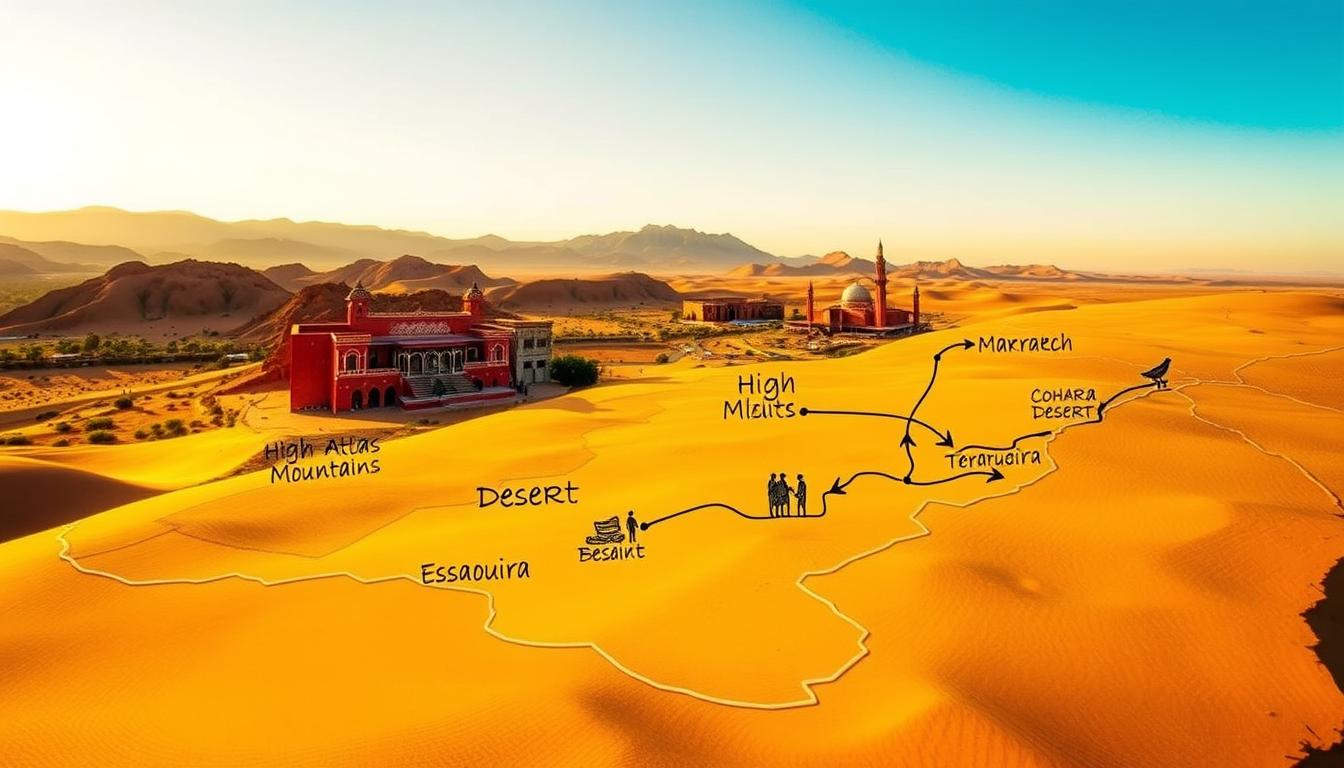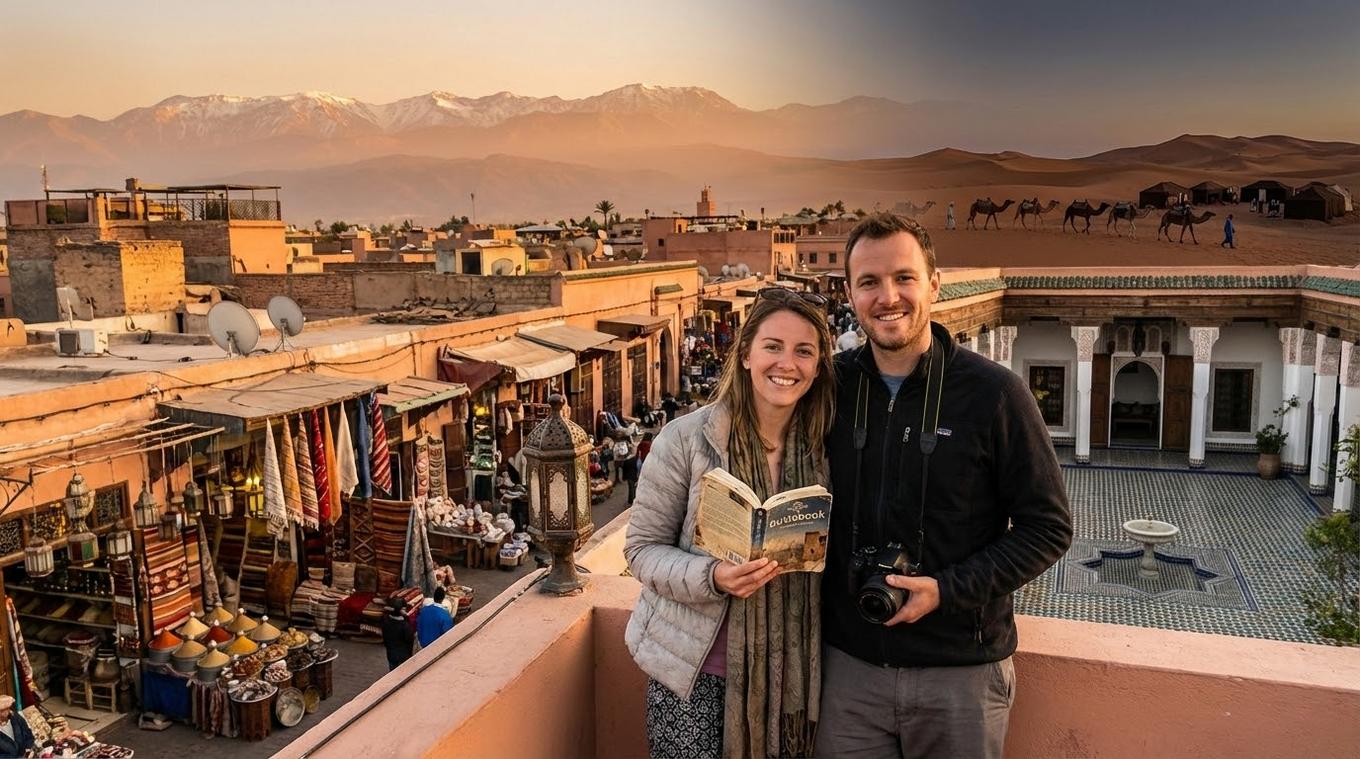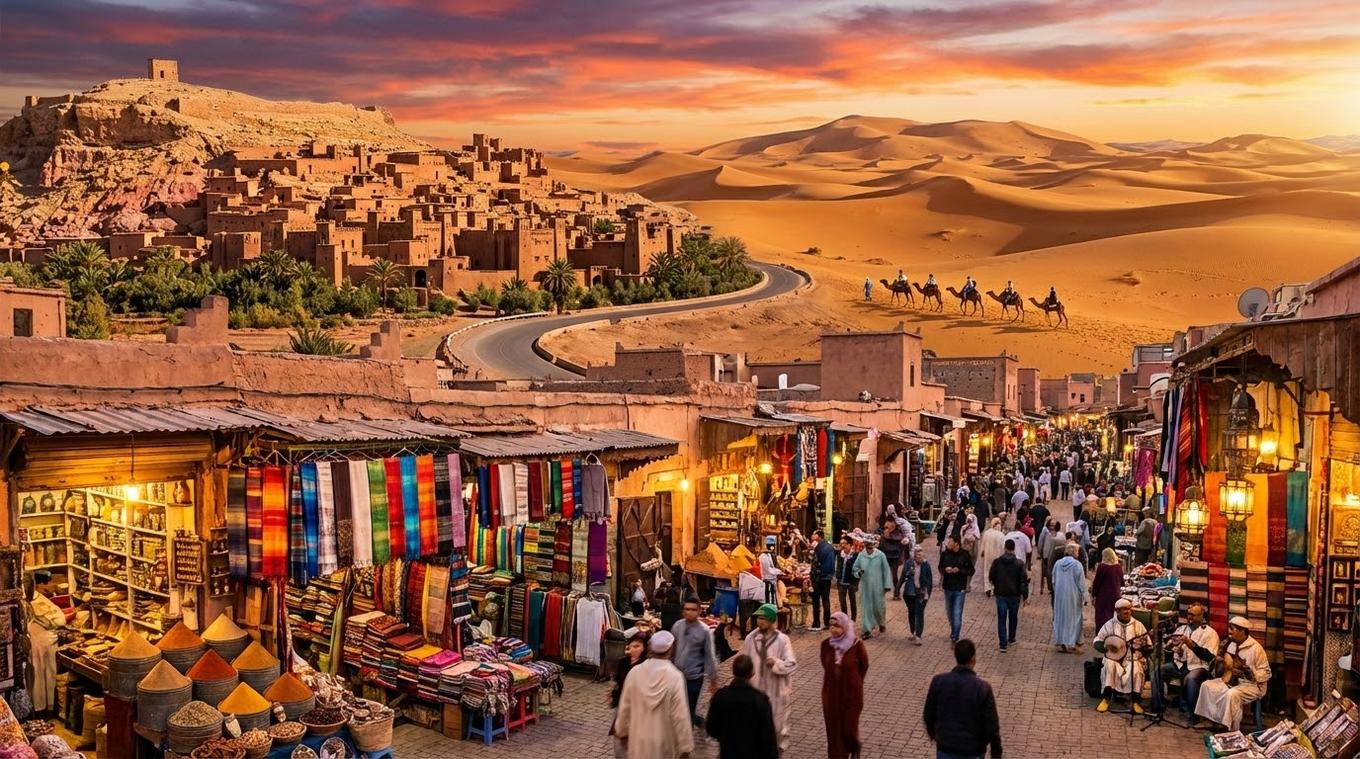Are you ready to explore Morocco’s vibrant culture and stunning landscapes? With limited time, planning a trip can be tough. Morocco has a lot to offer, from Marrakech’s busy streets to the peaceful Sahara Desert.
For those with a short trip, picking the best places is key. You can see historic medinas, visit famous spots like Jardin Majorelle, and try a traditional Moroccan dinner. A Morocco travel guide can help plan your trip.
Key Takeaways
- Prioritize top destinations like Marrakech, Fes, and the Sahara Desert.
- Explore historic medinas and visit iconic sites like Jardin Majorelle.
- Experience traditional Moroccan cuisine and culture.
- Consider budget-friendly options for accommodations and transportation.
- Plan your route in advance to make the most of your trip.
Day 1: Arrival in Marrakech
When you arrive in Marrakech, you’re thrown into a world of vibrant markets and rich culture. The city buzzes with a mix of old and new.
Explore the Medina and Djemaa el-Fna
Your day starts in the Medina, Marrakech’s historic heart and a UNESCO World Heritage site. You’ll find local crafts, spices, and souvenirs in the narrow alleys. Djemaa el-Fna, a lively square, is filled with snake charmers, performers, and food stalls. Don’t miss trying local street food like grilled meats or Moroccan pastries.
Visit the Majorelle Garden
Next, head to the Majorelle Garden, a beautiful botanical garden by French artist Jacques Majorelle. It’s a peaceful spot with exotic plants and blue buildings. The blue and green contrast is stunning.
Savor Local Cuisine
Trying Moroccan food is a must. It combines Arabic, Mediterranean, and African tastes. Make sure to try Tagine and Couscous. Many places in Marrakech offer cooking classes to learn how to make these dishes.
By the end of your first day, you’ve seen Marrakech’s culture, history, and food. This is just the start of your four-day Morocco adventure.
Day 2: Day Trip to the Atlas Mountains
On your second day in Morocco, take a day trip to the Atlas Mountains. This journey offers stunning landscapes and memorable moments. It’s a must-see attraction in Morocco that combines adventure and culture.
Choose the Right Trekking Route
Picking the right trekking route is key for a great Atlas Mountains experience. There are trails for all fitness levels and interests. The Setti Fatma trail is a favorite for its beautiful views and easy terrain.
- Beginner-friendly trails with minimal elevation gain
- Moderate trails with scenic viewpoints
- Challenging trails for experienced hikers
Think about your fitness and the season you visit. Spring and autumn are best for mild weather.
Experience Berber Culture
Visiting the Atlas Mountains lets you dive into Berber culture. The Berbers are Morocco’s indigenous people. Their villages show traditional life. You can visit, talk to locals, and learn about their customs.
| Cultural Experience | Description |
|---|---|
| Visit Berber Villages | Explore traditional villages and interact with locals |
| Learn Local Customs | Understand Berber traditions and way of life |
| Traditional Cuisine | Savor local dishes prepared with traditional methods |
Discover Scenic Waterfalls
The Atlas Mountains have beautiful waterfalls, like those in the Ourika Valley. The Setti Fatma waterfalls are a top spot. They offer a stunning view and a cool break from the heat.
For a four-day trip to Morocco, visiting the Atlas Mountains is a great travel tip. It combines adventure, nature, and culture.
Day 3: Journey to the Sahara Desert
Day 3 takes you to the Sahara Desert for unforgettable moments. It’s part of your Morocco travel planner. This day is all about exploring one of the world’s most famous landscapes.
Choose Between Merzouga or Erg Chebbi
Start by deciding between Merzouga or Erg Chebbi. Erg Chebbi is more popular for its easy access and tall dunes. Merzouga offers a quieter experience, perfect for those who want peace. Either way, the Sahara’s vast dunes are waiting for you.
Experience a Camel Trek
A camel trek is a must in the desert. Riding across the dunes, you’ll feel like you’re in a dream. It’s a slow, peaceful way to see Morocco in four days, with stunning views and lasting memories.
Spend the Night in a Desert Camp
At night, you’ll stay in a desert camp. The stars are bright above. The camp has music, dance, and more, plus local food and desert hospitality. It makes your Morocco travel planner dreams come true.
Day 4: Transition Back to Marrakech
Your last day in Morocco is a great chance to explore Marrakech again. You can visit historical sites, vibrant markets, and relaxing spas. This day lets you dive deeper into the city’s culture and history.
Visit the Saadian Tombs
Begin by visiting the Saadian Tombs, a site from the 16th century. It’s famous for its detailed architecture and stunning tile work. Rediscovered in 1917, it’s now a top spot in Marrakech.
Enjoy Shopping at the Souks
Next, go to Marrakech’s lively souks. You’ll find everything from traditional crafts to modern souvenirs. Remember, haggling is a big part of the souk experience.
| Item | Average Price | Tips |
|---|---|---|
| Traditional Crafts | $20-$50 | Look for authentic, handmade items. |
| Spices | $5-$10 | Smell before you buy to ensure freshness. |
| Textiles | $30-$100 | Check the material and quality. |
Relax at a Traditional Hammam
End your trip with a visit to a traditional Hammam. This Moroccan spa offers steam baths, exfoliation, and massage. It’s a perfect way to relax before you leave.
As you finish your four-day Morocco trip, you’ll remember Marrakech’s history, culture, and warm welcome.
Best Transportation Options
Knowing your travel options is key for a great Morocco trip. Morocco has many ways to get around, each with its own perks.
Navigating Marrakech
Marrakech’s narrow streets and busy markets can be tough to navigate. Walking is great for exploring the Medina. It lets you find hidden spots and talk to locals. For longer trips or when you’re in a hurry, taxis are a good choice. Always agree on the price first.
- Walking: Ideal for exploring the Medina and Djemaa el-Fna.
- Taxis: Convenient for longer distances within Marrakech.
Renting a Car vs. Guided Tours
Choosing between a car rental and a guided tour depends on what you like. Renting a car lets you travel at your own pace. But, driving in Morocco can be tricky, even for locals.
Guided tours, though, are easy and come with local tips. You can check out 4-day Marrakech to Fes tours that include transport.
- Renting a Car: Offers flexibility but requires driving skills in unfamiliar areas.
- Guided Tours: Provides local insights and eliminates driving stress.
Public Transport Options
Morocco’s public transport is affordable and works well. Supratours trains link big cities, while buses cover local areas. For a real local feel, try local buses or petit taxis for short trips.
| Mode | Description | Best for |
|---|---|---|
| Supratours Trains | Comfortable and relatively fast | Long-distance travel between cities |
| Local Buses | Affordable and frequent | Shorter distances and local travel |
| Petit Taxis | Convenient for short trips within cities | City travel, specially in Marrakech |
Local Cuisine You Must Try
Morocco’s local cuisine is a feast for the senses. On your 4-day journey, trying the local food is a must. Moroccan dishes blend Arab, Mediterranean, and African flavors, showing the country’s cultural mix.
Tagine: A Culinary Symbol
Tagine is a famous dish named after its cooking pot. It’s a slow-cooked stew with meat, veggies, and dried fruits, flavored with spices. Tagine is more than just a meal; it’s a culinary symbol of Morocco, showing the country’s hospitality and rich culture. You can find it everywhere, from fancy restaurants to small eateries.
Couscous and Other Staples
Couscous is another must-try dish. It’s made from semolina flour and served with veggies, meat, and sauce. Couscous is a versatile dish that can be enjoyed in various ways, from simple meals to festive dishes. Other must-try dishes include Harira, B’stilla, and Khobz bread.
Street Food Adventures
Exploring Morocco’s street food is a must. You’ll find everything from sizzling meat skewers to sweet treats like Makroud and Ghriba. Be adventurous and try some of the street food; it’s delicious and a great way to meet locals. Don’t miss the markets and squares, like Djemaa el-Fna in Marrakech.
Enjoying the local cuisine is a big part of the Moroccan experience. Whether it’s a Tagine, Couscous, or street food, you’re part of a long-standing tradition. Moroccan culture is deeply rooted in its food.
Cultural Etiquette to Respect
Traveling to Morocco means understanding local customs. Morocco’s rich culture makes it important to respect its traditions. This will make your trip more enjoyable.
Dress Code Guidelines
Morocco is a conservative country. Dressing modestly is key, mainly when visiting mosques or rural areas. Covering your shoulders and knees shows respect. Women should wear loose, body-covering clothes. Men should avoid shorts and sleeveless shirts.
Here are some specific guidelines to follow:
- Wear long-sleeved shirts and long pants or skirts.
- Avoid revealing clothing, such as low-cut tops or tight-fitting clothes.
- Consider carrying a scarf to cover your shoulders or head when needed.
Greeting Customs
Greeting customs in Morocco are important. The traditional greeting is ‘As-salamu alaykum’ (peace be upon you). The response is ‘Wa alaykum as-salam’ (and upon you be peace). Handshakes are common, but wait for the other person to start.
Some key points to remember:
- Use your right hand when giving or receiving something.
- Avoid physical contact with someone of the opposite sex unless they initiate it.
- Be patient and respectful during interactions.
Photography Dos and Don’ts
Photography is a great way to capture Morocco’s beauty. But, be respectful when taking pictures, mainly of people. Always ask for permission before taking someone’s photo. Be considerate of those who may not want to be photographed.
- Be respectful of people’s privacy and personal space.
- Avoid taking photos of sensitive areas, such as military or government buildings.
- Capture the vibrant markets, architecture, and landscapes, which are generally safe to photograph.
Essential Packing List for Your Trip
To have a great time in Morocco, follow these packing tips. Morocco’s weather and landscapes change a lot. So, plan well for your four-day adventure.
Clothing for Varying Climates
Morocco’s weather goes from cool mountains to hot deserts. Wear layers to stay comfortable. Include:
- Light clothes for hot days
- Warm clothes for cool nights, like in the desert
- Good shoes for walking or hiking
- Modest clothes that cover your shoulders and knees for mosques or rural places
Use a morocco travel planner to know the weather. This way, you’ll be ready.
Important Travel Documents
Before you explore Morocco in four days, make sure you have:
- A valid passport that’s good for at least six months
- Visa, if you need one (check with the Moroccan embassy or consulate)
- Travel insurance documents
- Proof of where you’re staying
- Health certificates or vaccination records if needed
Essentials for Desert Nights
For Sahara Desert nights, remember to bring:
- A warm sleeping bag or blanket for cold nights
- Comfortable shoes for camel rides
- A water bottle or hydration pack
- Sunscreen, sunglasses, and a hat for sun protection
- A small backpack with essentials for day trips
With these packing tips, you’ll be ready for Morocco. Enjoy your trip without stress.
Safety Tips for Travelers
When you start your 4-day trip to Morocco, safety is key. Morocco is a great place, but it has its own risks. Knowing what to do can make your trip better.
Staying Informed and Aware
It’s important to know what’s happening locally. Check your government’s travel advisories before you go. While in Morocco, keep up with local news and weather.
Understanding the local culture helps too. Morocco is conservative, so dress modestly, like when visiting mosques or rural spots.
Being aware of your surroundings is also key. In places like Marrakech’s Medina or Djemaa el-Fna, watch out for pickpockets. Keep your stuff safe and be alert, even in busy areas.
Managing Your Belongings
Keeping your belongings safe is important. Use a money belt or a secure bag for your valuables. Don’t show off expensive things that might draw attention.
For a 4-day Marrakech to Fes tour, keep important things in a safe spot. You can use hotel safes or lockers. This way, you can enjoy your trip without worry.
Emergency Contacts
Having emergency contacts is essential. Make sure you have your embassy or consulate’s info in Morocco. Also, keep important phone numbers, like the police and ambulance.
It’s good to have a local SIM card or an international plan for calls and texts. In an emergency, knowing some Arabic or using a translation app can help. For more trip planning tips, visit Africa Tours Marrakech for a 4-day Marrakech to Fes tour.
Best Times to Visit Morocco
To enjoy your four days in Morocco to the fullest, knowing the best times to visit is key. Morocco’s weather changes a lot from north to south and from coast to desert. So, when you go is important for a good trip.
Weather Considerations
The weather in Morocco is quite different. Coastal areas are mild, but the interior and desert get very hot during the day and cool at night. Spring (March to May) and autumn (September to November) are the best times to visit. You’ll find temperatures between 65°F and 75°F (18°C to 24°C).
Summer is very hot, with desert temperatures over 100°F (38°C). Winters can be cool to cold, with snow in the mountains.
Festivals and Local Events
Morocco is full of life with its festivals and local events. These can add a lot to your Morocco travel itinerary. The Marrakech International Film Festival in December is a big draw, attracting visitors worldwide.
The Essaouira Gnawa Music Festival in June is another highlight. It showcases traditional Gnawa music and draws both locals and tourists.
Avoiding Peak Tourist Seasons
While Morocco is popular, you can avoid the crowds. Visit during the shoulder season (April to May or September to October) for a more relaxed trip.
Also, consider a four-day trip during the week instead of on a weekend. This can help you dodge the peak tourist rush.
Accommodation Options in Morocco
Morocco has many places to stay, from fancy hotels to cheap options. You can choose to spend a lot or save money. There’s something for everyone.
Luxury Hotels vs. Budget Stays
In Morocco, you can pick between fancy hotels and affordable places. Fancy hotels have great service, fine food, and luxury. Budget stays are cheaper but offer the basics.
Think about what you want. If you want luxury, go for a fancy hotel. For a local feel and saving money, choose a budget stay.
- Luxury Hotels: Expect lavish decor, spas, and gourmet dining.
- Budget Stays: Simple, clean, and affordable, often with a local charm.
Unique Riad Experiences
Staying in a Moroccan Riad is a must. These old houses with gardens show off Moroccan style and welcome. Riads range from cozy homes to fancy hotels.
Tips for choosing a Riad:
- Look for Riads in the Medina for an authentic experience.
- Check reviews for service quality and cleanliness.
- Consider the location and proximity to attractions.
Apps and Websites for Booking
Booking a place to stay in Morocco is easy with apps and websites. Sites like Booking.com, Airbnb, and Expedia have lots of choices. They also have reviews and safe payment.
When booking, think about:
- Price Comparison: Use multiple sites to find the best deals.
- User Reviews: Read recent reviews to gauge the quality of the accommodation.
- Location: Ensure the accommodation is conveniently located for your plans.
Must-See Attractions in Morocco
Morocco is a country full of ancient landmarks and natural wonders. It offers an unforgettable journey. You’ll see attractions that show its rich heritage and beauty.
Historical Landmarks
Morocco has many historical landmarks. They show its complex past and culture. Some top spots include:
- The ancient city of Essaouira, with its well-preserved ramparts and vibrant arts scene.
- The historic city of Fez, featuring ancient medinas and architectural marvels.
- The Kasbah of Aït Benhaddou, a UNESCO World Heritage Site and filming location for numerous movies.
Natural Wonders
Morocco’s landscapes are diverse and stunning. You’ll find natural wonders that amaze. Some highlights are:
- The Sahara Desert, where you can experience the magic of the dunes and enjoy a camel trek.
- The Atlas Mountains, with scenic hiking trails and picturesque Berber villages.
- The Todra Gorge, a stunning canyon with towering cliffs and a lush oasis.
Vibrant Local Markets
Exploring Morocco’s local markets, or souks, is a must. You’ll find traditional handicrafts and local delicacies.
| Market | Location | Specialties |
|---|---|---|
| Souk Semmarine | Marrakech | Traditional handicrafts, spices, and textiles. |
| Essaouira Souk | Essaouira | Thuya woodwork, local jewelry, and fresh seafood. |
| Fez Souk | Fez | Ancient medina goods, traditional pottery, and leather goods. |
Visiting these attractions in Morocco will deepen your understanding. You’ll learn about its history, culture, and landscapes.
Money Matters: Currency and Budgeting
Knowing the financial side of your Morocco trip is key for a smooth journey. As you get ready for four days, learning about currency, budgeting, and tipping is vital. This will help you enjoy Morocco’s vibrant culture fully.
Exchange Rates and Local Currency
The Moroccan Dirham (MAD) is the official currency. It’s smart to exchange some money before or when you arrive. You can also get Dirhams from ATMs or exchange offices. Credit cards work in big cities and tourist spots, but cash is better in smaller places and souks.
Current Exchange Rates: Check online or use a currency app for the latest rates. Right now, 1 USD is about 10 MAD, but rates change.
Budgeting Your Four-Day Trip
Planning your Morocco budget depends on your travel style, where you stay, and what you do. Here’s a basic guide to help you plan:
| Expense | Low Budget | Mid Budget | High Budget |
|---|---|---|---|
| Accommodation per night | $10 | $30 | $100 |
| Food per meal | $3 | $10 | $20 |
| Transportation | $5 | $10 | $20 |
| Activities | $10 | $20 | $50 |
Tipping Customs in Morocco
Tipping in Morocco shows gratitude for good service. Here’s what to do:
- Restaurant Staff: 5-10 Dirhams per meal
- Tour Guides: 50-100 Dirhams per day
- Hotel Staff: 10-20 Dirhams per bag, 5-10 Dirhams for other services
By knowing these money tips, you can plan a great Morocco trip. You’ll have a fun and memorable time without spending too much.
Conclusion: Making the Most of Your Trip
As you finish planning your four-day trip to Morocco, you’ve made a great plan. It includes Marrakech’s lively streets, the calm Atlas Mountains, the Sahara Desert’s grandeur, and Morocco’s rich culture. With “four days in Morocco,” you’re ready to see the heart of this amazing country.
Recap of Your Journey
Your adventure started in Marrakech, where the Medina’s winding streets and Djemaa el-Fna square welcomed you. A trip to the Atlas Mountains showed you Berber culture and nature. The Sahara Desert called on the third day, with a camel ride and a night in a desert camp.
Your last day in Marrakech was for exploring the city’s history and culture.
Explore Beyond the Guide
This guide is a great start, but don’t be afraid to explore more. Talk to locals, try new foods, and enjoy the souks and riads. Morocco loves curious and open visitors.
Final Tips for an Unforgettable Experience
To enjoy your “four days in morocco,” stay open to changes, be ready for the weather, and respect local ways. With these tips, you’re set for an adventure that will give you unforgettable memories of Morocco’s beauty, kindness, and culture.



